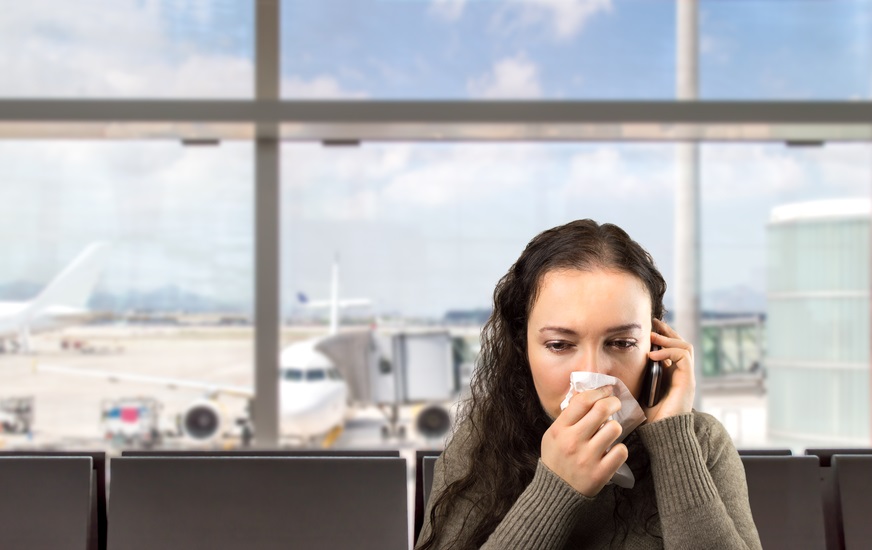The flu is contagious respiratory disease that infects the nose, throat, and lungs. Often confused with the common cold, the flu can actually lead to some serious complications if left untreated. In fact, 5% to 20% of the U.S. population gets the flu and more than 200,000 people are hospitalized from complications each year. Flu.gov also reports that annually, nearly 111 million workdays are lost due to the flu, which equals approximately $7 billion per year in sick days and lost productivity. According to Dr. Robert Wheeler, “Travelers could be even more susceptible to getting the flu because they’re coming into contact with more people than they normally would (think planes, public transportation, meetings, events, etc.), as well as potentially deviating from their healthy eating, exercise and sleep habits.” Below, Dr. Wheeler shares 7 things your travelers should know about the 2016-2017 flu season so you can help reduce their chances of getting the flu while also keeping them happier, healthier and more productive.

There are some new things to watch out for this season:
- The biggest thing to watch out for this flu season is that only injectable vaccines (flu shots) are recommended—the last three flu seasons, the nasal spray vaccine did not offer protection against the predominant strain of influenza virus and is therefore not suggested for use this season. Some other new things to be aware of for the 2016-2017 flu season include:
- Flu vaccines have been updated to better match circulating viruses; there will be some new vaccines on the market this season: this table shows all the influenza vaccines that are FDA-approved for use in the United States during the 2016-2017 season.
- The recommendations for vaccination of people with egg allergies have changed: based on the new recommendations, people with egg allergies no longer need 30 minutes of observation for an allergic reaction after receiving a flu vaccine.
Travelers should research the current flu activity in their destinations since flu seasons vary by location.
- For example, in the Northern Hemisphere, flu season can begin as early as October and can last as late as April or May. In the temperate regions of the Southern Hemisphere, flu activity typically occurs April through September; and, in the tropics, flu activity occurs throughout the year. The World Health Organization (WHO) provides global influenza updates on its website—scroll halfway down the page and click on ‘access the latest seasonal influenza update.’
Now is the time to get vaccinated if you live in the northern hemisphere.
- Annual vaccination remains the best way to protect against the flu and makes someone 60% less likely to need flu treatment from a healthcare provider. That CDC advises that everyone 6 months and older should get a flu vaccine every year by the end of October (if possible) before the U.S. flu season is in full swing. And while it’s certainly not too late to get the vaccine after October, early immunization is by far the most effective. Additionally, people who have not gotten a flu vaccine for the current season and are traveling to parts of the world where flu activity is ongoing should get the vaccine to protect themselves during their trip. Note: It’s important to get vaccinated at least 2 weeks before travel because it takes that long for immunity to develop after vaccination; also, the vaccine manufactured for the upcoming or current season usually expires the following June.
The vaccine is quick and easy to get.
- Travelers can get a flu shot at a doctor’s office, local health department, pharmacy, or urgent care clinic. Share the HealthMap Vaccine Finder with travelers so they can quickly find a convenient location to get a flu shot. Even better: consider organizing a flu vaccine clinic right at your worksite or institution. This will offer an easy, cost-effective and convenient way for your travelers to access the vaccine during work or school hours.
The flu vaccine does not cause the flu.
- We get this question all the time from travelers, but the truth is, the viruses in the flu shot are killed (flu shot) which means they cannot cause infection. However, travelers could experience some mild side effects such as soreness/muscle aches, headaches, and fever. Mild side effects usually begin soon after one receives the vaccine and last 1-2 days. Serious side effects, such as difficulty breathing, swelling, racing heart and a high fever are also possible and could begin within a few minutes to a few hours. If someone experiences any of these reactions, they should seek medical attention immediately.
Those with flu-like symptoms should delay travel.
- Yup, you read that right! Aside from the risk of infecting others, as mentioned previously, the flu can lead to some serious complications if left untreated. Flu symptoms could include fever, cough, sore throat, runny or stuffy nose, muscle or body aches, headache, and fatigue. Not everyone with flu will have a fever, but those who are sick should stay home until they are fever-free (sans a fever-reducing medicine) for at least 24 hours.
High risk individuals should seek medical attention immediately.
- Most people recover from the flu without medical treatment. However, those at increased risk should be vigilant about their symptoms and seek medical attention. High-risk individuals include those with compromised immune systems and/or chronic medical conditions like heart disease, diabetes, asthma and neurological conditions, those 65 years or older, pregnant women, and young children. Our travelers can contact us 24/7 for help in locating a physician in their area, or even a hospital if symptoms are severe.
For more information, contact us today to learn more about our holistic travel risk management programs for your organization.
Safe Travels!


